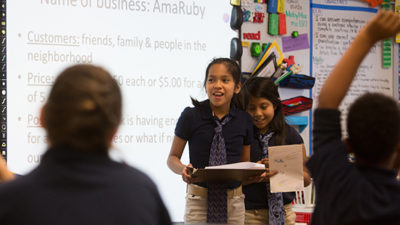Entrepreneurship training starts early at local elementary schools
Get ready, Kansas City. “Helicopters of Fun” is your next big success story.
It sounds like a sure thing. “Really big” remote-controlled helicopters selling for just $7. Free test flights – accompanied by the store owner, of course.
The downside is, you’ll probably have to wait a few years for Anthony, the young entrepreneur with the big idea, to get his startup funding, find a site and stock some inventory. He’s just in the fourth grade.
Anthony presented his business plan to about 20 classmates in teacher Peggy Everist’s classroom at J.A. Rogers Elementary in Kansas City Nov. 10. They all took turns describing their various concepts, from cupcake bakeries and pancake restaurants to shops selling personalized sports equipment. They identified potential customers, set prices and listed potential risks and their plans to deal with them.
Most importantly, they approached entrepreneurship as a problem-solving process: you identify a problem in the form of an unmet need, then develop a product or service to address it.
It was all part of a program called “Your Piece of the Pie: Today’s Youth, Tomorrow’s Entrepreneurs,” a program that teaches school-age children financial literacy and the entrepreneurial mindset. The program, now in its second year, is sponsored by two offices at the University of Missouri-Kansas City: KCSourceLink and the UMKC Office of Financial Literacy. The Federal Reserve Bank of Kansas City, the FDIC and Mid-Continent Public Library are also engaged in the development and implementation of the program.
The series was designed using teaching principles from the Federal Reserve Bank’s Teach Children to Save program and UMKC’s Center for Economic Education programs. The series uses the book “Sweet Potato Pie” by Kathleen D. Lindsey and Charlotte Riley-Webb, as well as videos that feature local businesses and highlight key entrepreneurial terms while sharing the business owner’s story. The curriculum enables students to learn about entrepreneurial concepts and how entrepreneurs benefit their economy by solving a problem. The curriculum is free and available to fourth- through sixth-grade teachers in metropolitan Kansas City.
“Pie,” in just its second year of existence, is growing rapidly. The program grew from eight classrooms in three districts last year to 19 classrooms in 11 local districts this year. Now, it is poised to go national.
Patricia A. Palmer, Ed.D., of UMKC’s Office of Financial Literacy; and Gigi Wolf, Senior Economic Education Specialist at the Kansas City Federal Reserve Bank, gave a presentation on “Piece of the Pie” at the annual conference of the Council for Economic Education in Phoenix; 22 teachers attended the session, from seven states: Arizona, Arkansas, Colorado, Indiana, Maryland, Mississippi, and New York. By next year, the program is expected to grow from 400 students in Missouri and Kansas to more than 1,000 spread across eight states.
Jenny Miller, a Network builder at KCSourceLink, worked with Everist’s class and sat in on the presentations.
“Teaching an entrepreneurial mindset helps people, children in this case, to think outside the box,” Miller said. “When you have someone who is able to identify a problem, then creatively come up with a way to solve that problem, innovation is able to occur. Teaching the entrepreneurial mindset at a young age allows for children to identify opportunity and gives them the skills to pursue those opportunities.”
It’s one more way in which UMKC and KCSourceLink are building and supporting an entrepreneurial culture in Kansas City – and beyond.
“There are six imperatives to make Kansas City the most entrepreneurial city, and this program works toward supplementing two of those: we need to have a pipeline of ideas coming to the market, and the talent available to support those ideas,” Miller said.
Back at J.A. Rogers, when Anthony completed his initial presentation, his peers – and a pair of “Shark Tank” style judges from KCB Bank – peppered him with questions.
For example, how would he protect his inventory, without any employees, while he was outside the shop supervising test flights?
Anthony was ready for that one. He’d simply lock the shop door behind him as they went out. “There will be only one key, and it will be on a chain around my neck at all times,” he proclaimed proudly.
The possible risk to his success: Storms. “People won’t want to go out and fly helicopters during storms.”
Classmates Vanessa and Yadira teamed up to create “Vandira’s Latina Desserts.” Like all of the business plans presented that morning, it also listed the required natural resources (flour, sugar, etc.) capital resources (ovens, pans) and human resources (bakers, managers). The risk: Having to buy supplies before they have any customers.
Ramello and Justin presented a concept called “Super Sports” offering personalized balls, bats and other sports equipment in customized color combinations. Judges Paul Bush and Shelly Handy – both vice presidents at KCB – asked how they would market their creations. The boys said they would give free samples to famous local professional athletes, and show up at youth sports tournaments to show off their wares.
A student asked the owners of “Sweets from Paris” what they would do if they couldn’t find the right ingredients for French pastries in Kansas City. Maria and Ruth calmly replied that they would source ingredients online.
As for Allen and Donovan, the owners of “Pancakes for Life,” their goal was to address a pressing problem in our community:
“Regular pancakes are boring. People want more flavor.”
John Martellaro|Division of Strategic Marketing and Communications

